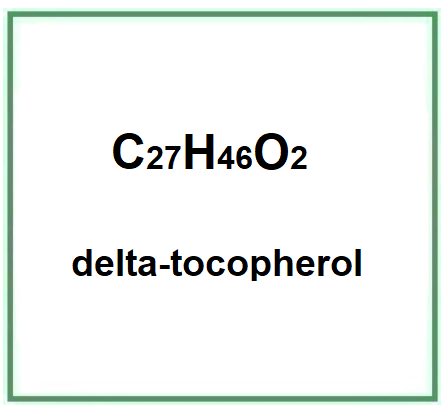E309 (Delta tocopherol) is one of the four isomer components that make up tocopherol: alpha-tocopherol, beta-tocopherol, delta-tocopherol and/or gamma-tocopherol.
Delta tocopherol occurs naturally in cereals, in oils and, in particular in:
It is a fundamental antioxidant and can be created using a synthesis procedure.
What it is used for and where
Medical
Its antioxidant action has effects on the brain (1), when, in the cardiovascular system, there are problems of diabetes caused by LDL cholesterol (2) and in liver diseases (3)
In the medical field it is an adjuvant to treat vascular diseases, as prevention for cellular diseases and for a correct functioning of the immune system.
δ-tocopherol is more active than α- or γ-tocopherol in inhibiting tumour growth (4).
Food
Ingredient included in the list of European food additives as E309, antioxidant.
Cosmetics
Antioxidant agent. Ingredient that counteracts oxidative stress and prevents cell damage. Free radicals, pathological inflammatory processes, reactive nitrogen species and reactive oxygen species are responsible for the ageing process and many diseases caused by oxidation.
Fragrance. It plays a decisive and important role in the formulation of cosmetic products as it provides the possibility of enhancing, masking or adding fragrance to the final product, increasing its marketability. The consumer always expects to find a pleasant or distinctive scent in a cosmetic product.
Skin conditioning agent - Miscellaneous. This ingredient has the task of modifying the condition of the skin when it is damaged or dry by reducing its flakiness and restoring its elasticity.
Skin conditioning agent - Occlusive. This ingredient has the task of modifying the condition of the skin when it is damaged or dry by reducing flaking and restoring elasticity. It has a strong lipophilic character and is identified as an occlusive ingredient; it is generally composed of oily and fatty materials that remain on the skin surface and reduce trans epidermal water loss.
"Delta-tocopherol studies"
Molecular Formula: C27H46O2
Molecular Weight: 402.7 g/mol
- CAS: 119-13-1
- EC Number: 204-299-0
- UNII: JU84X1II0N
- PubChem Substance ID 24900009
- MDL number MFCD20486794
- eCl@ss 34058016
- NACRES NA.79
- DSSTox ID DTXSID1046263
- IUPAC (2R)-2,8-dimethyl-2-[(4R,8R)-4,8,12-trimethyltridecyl]-3,4-dihydrochromen-6-ol
- InChl=1S/C27H46O2/c1-20(2)10-7-11-21(3)12-8-13-22(4)14-9-16-27(6)17-15-24-19-25(28)18-23(5)26(24)29-27/h18-22,28H,7-17H2,1-6H3/t21-,22-,27-/m1/s1
- InChl Key GZIFEOYASATJEH-VHFRWLAGSA-N
- SMILES CC1=CC(=CC2=C1OC(CC2)(C)CCCC(C)CCCC(C)CCCC(C)C)O
- ChEBI 47772
- Nikkaji J5.309K
- Metabolomics Workbench 29107
- NCI C63645
Synonyms:
References___________________________________________________________________________
(1) Effect of vitamin E on cerebral cortical oxidative stress and brain-derived neurotrophic factor gene expression induced by hypoxia and exercise in rats.
Sakr HF, Abbas AM, El Samanoudy AZ.
J Physiol Pharmacol. 2015 Apr;66(2):191-202.
(2) Protective Effect of Vitamin E against Diabetes-Induced Oxidized LDL and Aorta Cell Wall Proliferation in Rat.
Shirpoor A, Norouzi L, Nemati S, Khadem Ansari MH.
Iran Biomed J. 2015 Apr;19(2):117-23.
(3) Prevention of hepatocellular carcinoma: Focusing on antioxidant therapy.
Miyanishi K, Hoki T, Tanaka S, Kato J.
World J Hepatol. 2015 Mar 27;7(3):593-9. doi: 10.4254/wjh.v7.i3.593. Review.
Protective effects of vitamin E against liver damage caused by renal ischemia reperfusion.
Khastar H. Ren Fail. 2015 Feb 2:1-3.
(4) Li GX, Lee MJ, Liu AB, Yang Z, Lin Y, Shih WJ, Yang CS. δ-tocopherol is more active than α - or γ -tocopherol in inhibiting lung tumorigenesis in vivo. Cancer Prev Res (Phila). 2011 Mar;4(3):404-13. doi: 10.1158/1940-6207.CAPR-10-0130.
![]() E309
E309 



